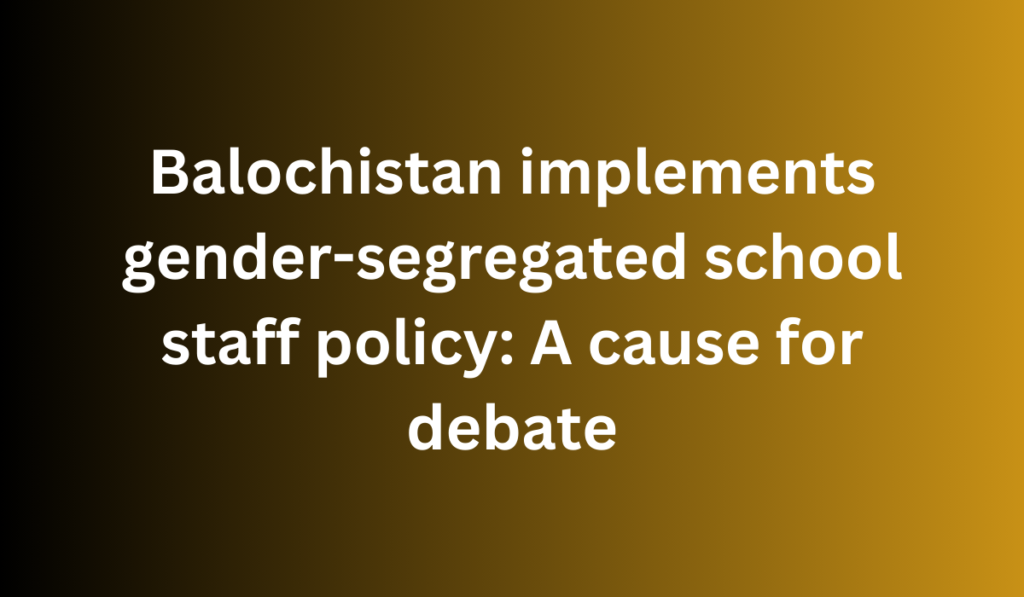Balochistan implements gender-segregated school staff policy: A cause for debate
Contents
Balochistan implements gender-segregated school staff policy: A cause for debate
The Balochistan government has introduced a controversial policy mandating all-female staff in girls’ schools across the province. The move has sparked debate, with some praising it for promoting a safer environment for girls and others criticizing it for potential limitations and lack of inclusion.
REASONS BEHIND THE POLICY
The Balochistan government has given several reasons for implementing this policy:
- Cultural Sensitivity: The policy is seen as addressing the cultural sensitivities of certain communities in Balochistan where there may be concerns about male teachers interacting with female students.
- Improved Security: Proponents say this could create a safer environment for girls, especially in areas with security concerns.
- FOCUS ON FEMALE EDUCATION: Some believe that it may encourage more girls to pursue education if they feel more comfortable in an all-female environment.
Potential Concerns
Although there are supporters of this policy, there are concerns that need to be addressed:
- Shortage of teachers: Balochistan is already facing shortage of qualified teachers. This policy may exacerbate the problem, particularly in rural areas where qualified female teachers may be difficult to find.
- Limited Exposure: Opponents argue that excluding male teachers can deprive girls of exposure to diverse perspectives and role models.
- Sustainability: There are concerns about the long-term sustainability of this policy, especially if it hinders the recruitment of qualified teachers based solely on gender.
look forward
The effectiveness of this policy will depend on its implementation and the government’s ability to address potential shortcomings:
- Teacher Training: Focus on training and capacity building for women teachers to ensure they have the necessary skills and competencies.
- Community Engagement: Open communication and engagement with communities to address concerns and ensure policy meets their needs.
- Monitoring and evaluation: Regular monitoring of the policy’s impact on educational quality, teacher availability, and student enrollment, particularly in girls’ schools.
Result
The Balochistan government’s female-only staffing policy for girls’ schools is a complex issue with both potential advantages and disadvantages. Careful planning, implementation, and continuous evaluation are essential to ensure that it achieves its intended goals without hindering the quality of education or creating limitations for students and teachers.
Frequently Asked Questions
Question: Why Balochistan government followed this policy?
A: The government cites cultural sensitivities, security concerns, and possibly encouraging girls’ education in female-only environments.
*What are the potential drawbacks of this policy?
A: Concerns include teacher shortages, limited exposure to diverse perspectives for girls, and long-term sustainability of the policy.
What steps can be taken to ensure the success of this policy?
A focus on teacher training, community involvement, and monitoring policy impacts on educational quality and student enrollment is critical.
بلوچستان صنفی طور پر الگ اسکول اسٹاف پالیسی نافذ کرتا ہے: بحث کی ایک وجہ
بلوچستان حکومت نے ایک متنازع پالیسی متعارف کرائی ہے جس میں صوبے بھر کے لڑکیوں کے سکولوں میں صرف خواتین کا عملہ لازمی ہے۔ اس اقدام نے بحث چھیڑ دی ہے، کچھ لڑکیوں کے لیے محفوظ ماحول کو فروغ دینے کے لیے اس کی تعریف کرتے ہیں اور دوسروں نے ممکنہ حدود اور شمولیت کی کمی کے لیے اس پر تنقید کی ہے۔
پالیسی کے پیچھے کی وجوہات
بلوچستان حکومت نے اس پالیسی کو نافذ کرنے کی کئی وجوہات بیان کی ہیں:
- ثقافتی حساسیت: پالیسی کو بلوچستان میں بعض کمیونٹیز کی ثقافتی حساسیت کو پورا کرنے کے طور پر دیکھا جاتا ہے جہاں خواتین طلباء کے ساتھ بات چیت کرنے والے مرد اساتذہ کے بارے میں خدشات ہوسکتے ہیں۔
- بہتر سیکیورٹی: حامیوں کا کہنا ہے کہ یہ لڑکیوں کے لیے خاص طور پر سیکیورٹی خدشات والے علاقوں میں زیادہ محفوظ ماحول پیدا کرسکتا ہے۔
- خواتین کی تعلیم پر توجہ: کچھ کا خیال ہے کہ اگر وہ تمام خواتین کے ماحول میں زیادہ آرام دہ محسوس کرتی ہیں تو یہ زیادہ لڑکیوں کو تعلیم حاصل کرنے کی ترغیب دے سکتی ہے۔
ممکنہ خدشات
اگرچہ اس پالیسی کے حامی ہیں، ایسے خدشات بھی ہیں جن پر توجہ دینے کی ضرورت ہے:
- اساتذہ کی کمی: بلوچستان کو پہلے ہی قابل اساتذہ کی کمی کا سامنا ہے۔ یہ پالیسی مسئلہ کو بڑھا سکتی ہے، خاص طور پر دیہی علاقوں میں جہاں اہل خواتین اساتذہ کو تلاش کرنا مشکل ہو سکتا ہے۔
- محدود نمائش: مخالفین کا استدلال ہے کہ مرد اساتذہ کو چھوڑنے سے لڑکیوں کو متنوع نقطہ نظر اور رول ماڈل کی نمائش سے محروم کیا جاسکتا ہے۔
- پائیداری: اس پالیسی کی طویل مدتی پائیداری کے بارے میں خدشات موجود ہیں، خاص طور پر اگر یہ صرف صنف کی بنیاد پر اہل اساتذہ کی بھرتی میں رکاوٹ ہے۔
آگے دیکھ
اس پالیسی کی تاثیر کا انحصار اس کے نفاذ اور حکومت کی ممکنہ کوتاہیوں کو دور کرنے کی صلاحیت پر ہوگا:
- اساتذہ کی تربیت: خواتین اساتذہ کے لیے تربیت اور صلاحیت کی تعمیر پر توجہ تاکہ یہ یقینی بنایا جا سکے کہ ان کے پاس ضروری مہارتیں اور قابلیتیں ہیں۔
- کمیونٹی انگیجمنٹ: خدشات کو دور کرنے اور پالیسی ان کی ضروریات کے مطابق ہونے کو یقینی بنانے کے لیے کمیونٹیز کے ساتھ کھلی بات چیت اور مشغولیت۔
- مانیٹرنگ اور تشخیص: تعلیمی معیار، اساتذہ کی دستیابی، اور طالب علموں کے اندراج پر پالیسی کے اثرات کی باقاعدہ نگرانی، خاص طور پر لڑکیوں کے اسکولوں میں۔
نتیجہ
لڑکیوں کے اسکولوں کے لیے بلوچستان حکومت کی صرف خواتین کے لیے عملے کی پالیسی ایک پیچیدہ مسئلہ ہے جس کے ممکنہ فوائد اور نقصانات دونوں ہیں۔ احتیاط سے منصوبہ بندی، عمل درآمد، اور مسلسل تشخیص اس بات کو یقینی بنانے کے لیے بہت ضروری ہے کہ یہ اپنے مطلوبہ اہداف کو تعلیم کے معیار میں رکاوٹ پیدا کیے بغیر یا طلبہ اور اساتذہ کے لیے محدودیتیں پیدا کیے بغیر حاصل کرے۔
اکثر سوالات
سوال: بلوچستان حکومت نے اس پالیسی پر عمل کیوں کیا؟
A: حکومت ثقافتی حساسیت، سیکورٹی خدشات، اور ممکنہ طور پر صرف خواتین کے ماحول میں لڑکیوں کی تعلیم کی حوصلہ افزائی کا حوالہ دیتی ہے۔
* اس پالیسی کی ممکنہ خرابیاں کیا ہیں؟
A: خدشات میں اساتذہ کی کمی، لڑکیوں کے لیے متنوع نقطہ نظر کی محدود نمائش، اور پالیسی کی طویل مدتی پائیداری شامل ہیں۔
اس پالیسی کی کامیابی کو یقینی بنانے کے لیے کیا اقدامات کیے جاسکتے ہیں؟
اساتذہ کی تربیت، کمیونٹی کی شمولیت، اور تعلیمی معیار اور طلباء کے اندراج پر پالیسی کے اثرات کی نگرانی پر توجہ مرکوز کرنا بہت ضروری ہے۔





